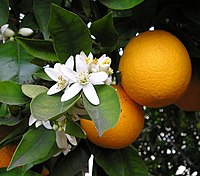
Back Orange (Frucht) ALS ብርቱካን (ፍሬ) Amharic Narancha (fruita) AN Cīnæppel ANG برتقال Arabic برتقال ARZ সুমথিৰা টেঙা Assamese Naranxa (frutu) AST Portağal (meyvə) Azerbaijani پورتاقال AZB
| Orange | |
|---|---|

| |
| Orange blossoms and oranges | |
| Scientific classification | |
| Kingdom: | |
| Division: | |
| Class: | |
| Order: | |
| Family: | |
| Genus: | |
| Binomial name | |
| Citrus sinensis (L.)
| |
The term orange can mean any citrus tree that produces fruit for people to eat. Oranges are a very good source of Vitamin C.[1] Orange juice is an important part of many people's breakfast. The "sweet orange", which is the kind that are most often eaten today, grew first in South and East Asia but now grows in lots of parts of the world.
Oranges are round, orange-coloured fruit that grow on a tree which can reach 10 metres (33 ft) high. Orange trees have dark green shiny leaves and small white flowers with five petals. The flowers smell very sweet which attracts many bees.
An orange has a tough shiny orange skin that holds acid in outside layer. Inside, the fruit is divided into "segments", which have thin tough skins that hold together many little "vesicles" with juice inside. There are usually ten segments in an orange, but sometimes there are more or less. Inside each segment of most types of orange there are seeds called "pips". Orange trees can be grown from pips, but some types of orange trees can only be grown from "cuttings" (a piece cut off a tree and made to grow roots). The segments and the skin are separated by white stringy fibrous material called "pith". In most types of oranges, the skin can be peeled off the pith, and the segments can be pulled apart with the fingers to be eaten. In some oranges it is hard to take the skin off. Orange skin is often called "orange peel".
Oranges are an important food source in many parts of the world for several reasons. They are a commonly available source of vitamin C. They last longer than many other fruits when they are stored. They are easy to transport because each orange comes in its own tough skin which acts as a container. They can be piled into heaps or carried in bags, lunchboxes and shipping containers without being easily damaged.
The colour orange got its name from the fruit. The word "orange" is unusual because it is one of only a few English words that do not rhyme with anything.[2]
The orange is particularly used in Asia for wide variety of purposes including cosmetic as well as medicinal.[3] Doctors prescribe oranges for people who suffer from diabetes.
- ↑ "Vitamin C content".
- ↑ OED Archived 2008-10-15 at the Wayback Machine There are only part-rhymes like "lozenge" and "Stonehenge"
- ↑ "Weight Loss: Oranges May Help Manage Obesity –". Lose Weight. 2020-07-25. Archived from the original on 2020-07-25. Retrieved 2020-07-25.
© MMXXIII Rich X Search. We shall prevail. All rights reserved. Rich X Search